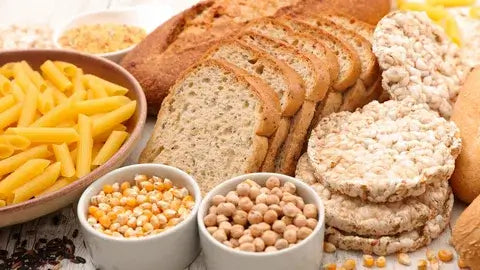Gluten can be found in a variety of everyday foods. Some of them, such as cakes and sweets, are among our favourites.
But is this in the category of halal?
The manufacturing procedure of Wheat Gluten is according to Islamic law and is free from pig products, alcohol, and certain other ingredients.
Halal is a term that means permissible or legal. It is the dietary standard, as provided by the Koran.
Get a free sample pack!What is gluten?
Gluten must be 100 per cent plant-based and free of pork or other haram ingredients in order to be considered halal. To comprehend it at a deeper level, we must first comprehend what gluten is and the various sources from which it is derived.
Gluten is a protein that can be found in wheat, barley, and rye, among other seeds. It's found in a variety of meals, including bread, pasta, and cereal.
Gluten does not have any necessary nutrients, thus it can be substituted with a well-balanced, whole-foods-based diet rich in vegetables, fruits, healthy fats, and lean protein sources.
Gluten has tremendous uses in baking. Mixing wheat flour with water forms a dough. Which we flavour depending on what type of pastry we’re making.
Every dough has its characteristics and composition. Dough manufactured from barley flour, for example, differs significantly from dough prepared from wheat.

Which gluten is halal?
Wheat Gluten and Vital Wheat Gluten are both considered halal as plant-based substances.
Wheat gluten is a popular halal culinary and beverage ingredient.
Vital wheat gluten is a protein derived from wheat grains. Vital wheat gluten is a super-strength flour made entirely of gluten with very little starch.
It is prepared from wheat flour that has been soaked to activate the gluten and then processed to remove everything except the gluten. After that, it's dried and processed again into a powder.

Are all flours halal?
Many people are confused as to how flour may be certified as halal, and why this certification is even required.
Vegetarian food is generally halal under Islamic law. They may, however, contain non-halal ingredients, making them haram.
The same can be said for flour. It's possible that processed flour contains additives that render it non-halal. As a result, certification is required to ensure that the flour is halal.
Wheat flour is categorized into two types: strong flour and soft flour.
Strong flour is commonly used in the production of bread, puff pastry, and other fermented products. While biscuits and cookies are frequently made with soft flour.
The fundamental difference between strong flour and soft flour is the gluten level, with strong flour containing around 13% gluten and soft flour containing around 8.3%.
Gluten is responsible for raising flour dough once it has been soaked and added to, or fermented with yeast.
Aside from adding additives to flour to improve its features, some additives are added to flour to increase its nutritional value. Minerals and vitamins are used as additions.
The incorporation of vitamins like vitamin A, which are not fat-soluble and get quickly destroyed during storage, is important in terms of halal.
It's possible that processed flour has additives that render it non-halal. As a result, certification is required to ensure that the flour is halal.
What is the difference between gluten and gelatine?
Proteins are found in both. Proteins are essential for cellular growth and repair, and they constitute an important element of our diet.
Gluten is found in a variety of cereal grains, including wheat. It's what gives bread dough its stretchiness as it's expanding and enables the bread to stay together as it rises.
Gelatin is a protein derived from a variety of sources. Animal products are used to make gelatin. As a result, vegetarians and vegans refuse to consume gelatin-based products.
Kosher gelatine doesn’t fall in the same category as normal gelatine that we all know of. Kosher gelatin is made from kosher slaughtered and processed cow sources or kosher fish species, indicating that they follow the halal guidelines.
Conclusion
Always check the product label to ensure that what you're buying falls inside the halal category. It's possible that the products have been processed, and the addition of additives has rendered them non-halal.
As a result, certification to confirm that the flour is halal is essential.
Chewwies is one of the few companies committed to creating vegan, vegetarian, halal, and kosher gummies.
All our products are free from sugar, gelatine, alcohol, gluten, dairy, allergens, artificial colours, flavours, and preservatives.


